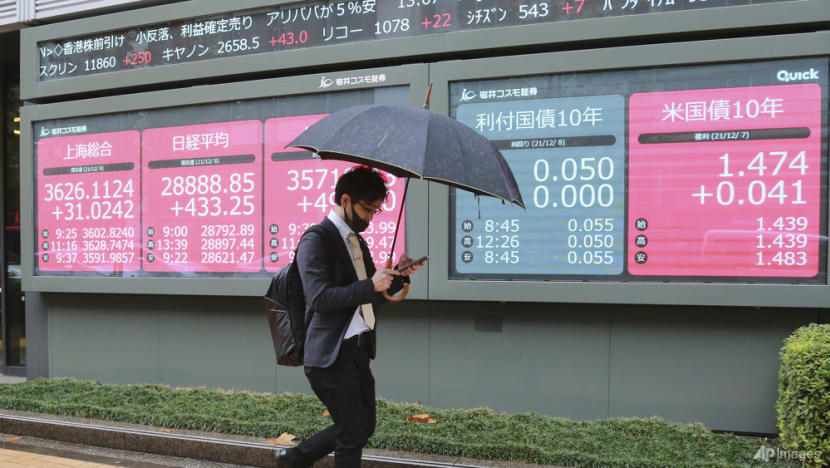Commentary: Countries must be prepared if further restrictions to curb Omicron variant needed in coming days
Besides epidemiology and vaccination studies, COVID-19 has taught us invaluable lessons on economic vulnerability, says a UK economist.

LONDON: The shadow of the Omicron variant hangs over the global economy.
Even though we remain largely ignorant of its transmissibility, virulence and ability to evade the protection of vaccination or prior infection, there is no better time to take stock of the economic lessons from the past two years in order to help set policy now.
Most important is that when a serious virus is circulating, you cannot separate economics from epidemiology.
There is clearly a trade off between restrictions on normal daily life and short-term economic activity, but the underlying cause of both health and economic troubles is the severity of the epidemic. Controlling the virus is paramount.
Early and strict lockdowns were most successful in 2020 and operated well in much of Asia and the Pacific.
But this year, effective vaccines and treatments have allowed life to return closer to normal in Europe and the US, so long as countries could encourage and coerce sufficient numbers of people to be inoculated.
The promise of effective vaccines also lowers the cost of temporary economic restrictions at the start of a wave because an end to disruption is credibly in sight. They remove the need for the draconian restrictions inherent in a zero-COVID-19 approach.
If the link between economics and epidemiology has been a case of learning by doing, pure economic policy in rich countries has been a triumph, underpinned by a welcome absence of ideology.
Last year witnessed the worst global drop in per capita gross domestic product since World War II but the latest OECD forecasts suggest that by the end of 2022, advanced economies will have recovered all of the lost ground compared with its November 2019 forecasts.
For these countries, “Build Back Better” is not a hollow slogan, but the most likely outcome.
Related:
ECONOMIC IMPACTS
Successful vaccination has transformed the outlook this year alongside skilful deployment of economic policy in rich countries. Fiscal support for people and companies affected by economic restrictions was rapid and generous.
In emerging economies, the lack of fiscal space prevented equivalent fiscal support and explains their worse performance and the current assessment that they will suffer lasting damage from the pandemic.
They were also initially lower down the pecking order to gain access to vaccines.
Rapid action by central banks to quell initial turmoil in financial markets and a willingness to enable governments to borrow and spend their way through the crisis with extensive purchases of assets also played an important role.
No one should get hung up on concerns that the taboo on monetising government debt has been broken, so long as the policies are temporary and they show willingness to prevent persistent inflationary pressure.
The return of inflation has been the most visible demonstration of a third lesson: fine-tuning the response to a crisis is impossible. With a huge surge in global demand for goods, higher prices became inevitable and almost impossible to avoid.
That price rises are more ingrained in the US, where wage inflation has risen higher, is a valuable reminder that resource constraints in economics are real. Governments cannot simply run economies at ever higher pressure without overheating.
The final economic lesson of the past two years is that policy details matter. The OECD’s recent economic outlook shows that the US recovery outperformed the eurozone in terms of gross domestic product, but lagged European countries in terms of employment.
This relates to the type of fiscal support offered during the pandemic and demonstrates important trade-offs.
European countries tied job support to employers, keeping workers attached to their jobs, but paid the price in terms of lower productivity and delays in ensuring new jobs were created in areas where demand and spending was high.
The US was better at reallocating employees to new jobs by attaching support to individuals rather than employers, but it came at the cost of finding that a much larger number fell out of the labour market altogether.
It is still too early to evaluate which will ultimately prove more successful.

DEALING WITH OMICRON
With these lessons in mind, we can turn to the Omicron variant. The early evidence suggests it is much more transmissible than the Delta variant.
It is also possibly milder, but it is not clear whether lower virulence is an innate property of the variant, the result of protection against severe disease coming from past infection or inoculation, or, more worryingly, that the age profile of positive cases has been young to date in South Africa.
Countries need time to formulate policy, yet in South Africa and the UK, Omicron cases appear to be growing at extraordinary speed.
The lesson from earlier in the pandemic is to act fast rather than seek to optimise, so it is time for governments in rich countries to adopt the precautionary principle as well as accelerate vaccine boosters.
This means building on travel restrictions with the reintroduction of curbs on daily life while also preparing fiscal policy tools to spring back into life if further restrictions are needed in the coming days.
Let us hope these measures prove to be an overreaction, especially if vaccines turn out to be effective at preventing severe disease. Little long-term damage will be done. Far better that than the alternative of waiting and risking a much worse Omicron wave.
















